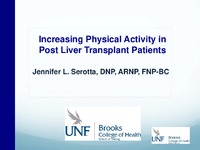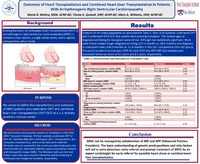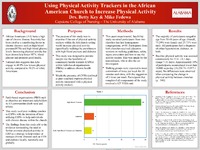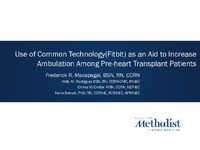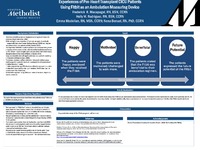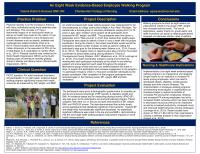| dc.contributor.author | Serotta, Jennifer | en |
| dc.date.accessioned | 2016-03-17T11:56:41Z | |
| dc.date.available | 2016-03-17T11:56:41Z | |
| dc.date.issued | 2016-03-17 | |
| dc.identifier.uri | http://hdl.handle.net/10755/601501 | en |
| dc.description | <p>Caring for a Diverse World</p> | en |
| dc.description.abstract | <p><strong>Background:</strong> Quality of life (QOL) has been shown to improve dramatically in patients after liver transplant, however, it is still low compared to the general population. Patients oftentimes are severely debilitated and unable to engage in physical activity by the time they undergo transplant, which carries over following transplant. The literature supports that liver transplant patients who engage in physical activity have improved QOL.</p>
<p><strong>Purpose:</strong> The purpose of this quality improvement project was to increase physical activity among postoperative adult liver transplant patients, improve documentation of daily activity, and ultimately influence QOL.</p>
<p><strong>Methods:</strong> Thirteen liver transplant patients were recruited within seven days of their post-operative hospitalization. Twelve patients consented, were educated about the benefits of walking, given instructions for how to gradually increase their walking activity, and how to track this activity in a daily log. The International Physical Activity Questionnaire (IPAQ) that calculates level of physical activity (metabolic equivalent or MET score) was administered at baseline, six weeks, and four months. Patients also rated their perceived quality of life on a ten-point scale.</p>
<p><strong>Findings/Implications:</strong> Eight patients participated for six weeks of the study, and six patients completed four months of the study. Four patients were medically unable to complete the walking program. Baseline MET and QOL scores were compared among baseline, six weeks, and four months. The IPAQ baseline score increased from 407.5 MET to 1,711.5 MET at six weeks and to 1935.75 MET at four months, however, results were not statistically significant. Quality of life improved an average score at baseline of 5.5 (SD=2.51) to 8.25 (SD=1.67) at six weeks, and 8.3 at four months which was statistically significant (P=0.27) and was consistent with findings in the literature. The participants gradually increased their walking activity over the four months and documented that activity daily. Implementing a walking program post liver transplant is feasible and beneficial for patients and should be a standard of care.</p> | en |
| dc.format | Text-based Document | en |
| dc.language.iso | en_US | en |
| dc.subject | Liver Transplant | en |
| dc.subject | Physical Activity | en |
| dc.title | Increasing physical activity in post liver transplant patients | en |
| dc.type | Presentation | en |
| dc.rights.holder | <p>
All rights reserved by the author(s) and/or publisher(s) listed in this item record unless relinquished in whole or part by a rights notation or a Creative Commons License present in this item record.
</p><p>
All permission requests should be directed accordingly and not to the Sigma Repository.
</p><p>
All submitting authors or publishers have affirmed that when using material in their work where they do not own copyright, they have obtained permission of the copyright holder prior to submission and the rights holder has been acknowledged as necessary.
</p> | |
| dc.type.category | Full-text | en |
| dc.evidence.level | N/A | en |
| dc.research.approach | N/A | en |
| dc.contributor.department | Lambda Rho at-Large | en |
| dc.author.details | Jennifer Serotta, DNP, ARNP, FNP-BC | en |
| dc.conference.name | STTI Lambda Rho Chapter’s 2016 Nursing Research Conference | en |
| dc.conference.host | Lambda Rho at-Large Chapter of Sigma Theta Tau International Honor Society of Nursing | en |
| dc.conference.location | Jacksonville, Florida, USA | en |
| dc.date.conferenceyear | 2016 | |
| dc.description.reviewtype | Abstract Review Only: Reviewed by Event Host | en |
| dc.description.acquisition | Proxy-submission | en |
